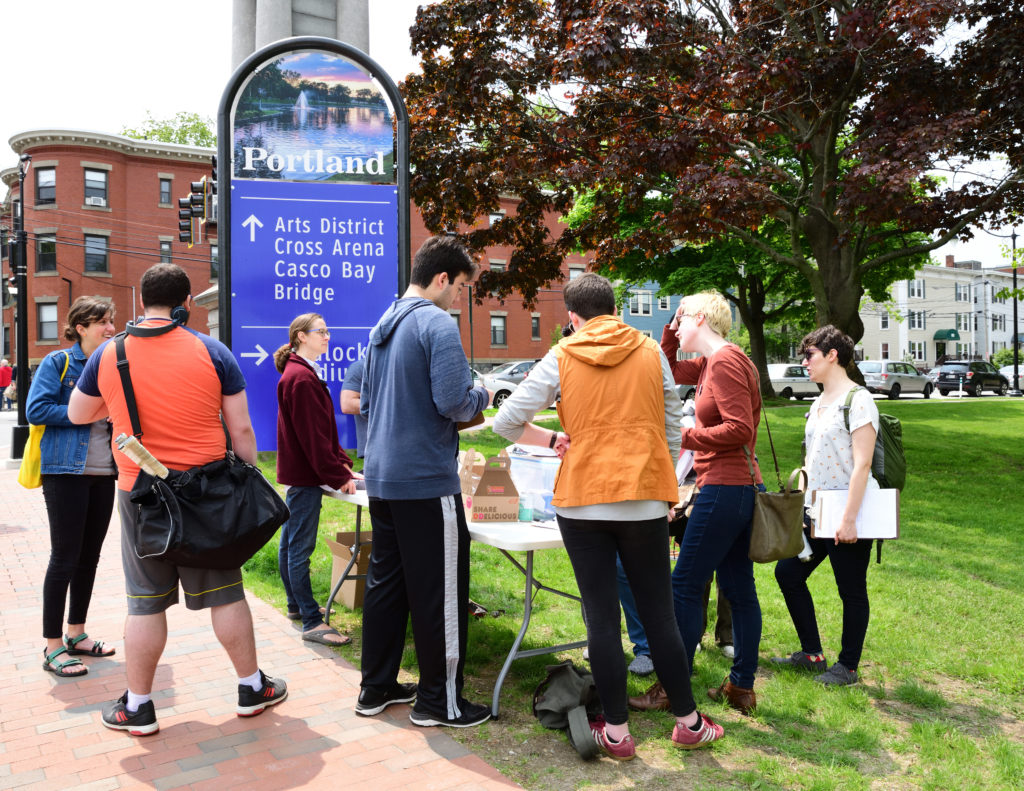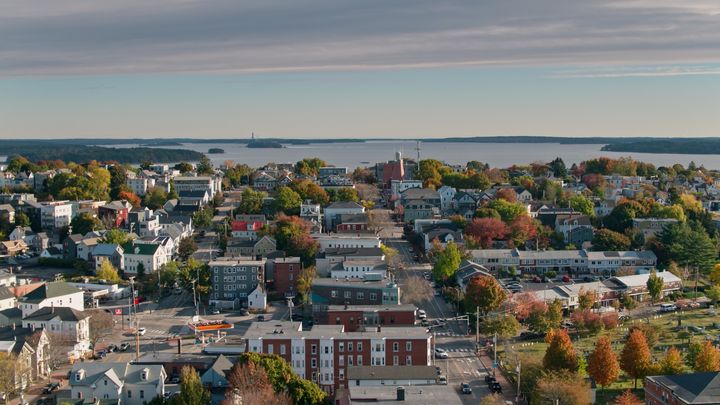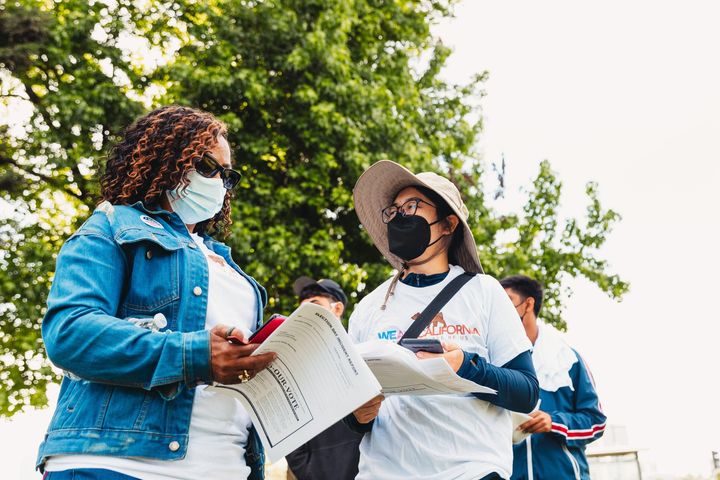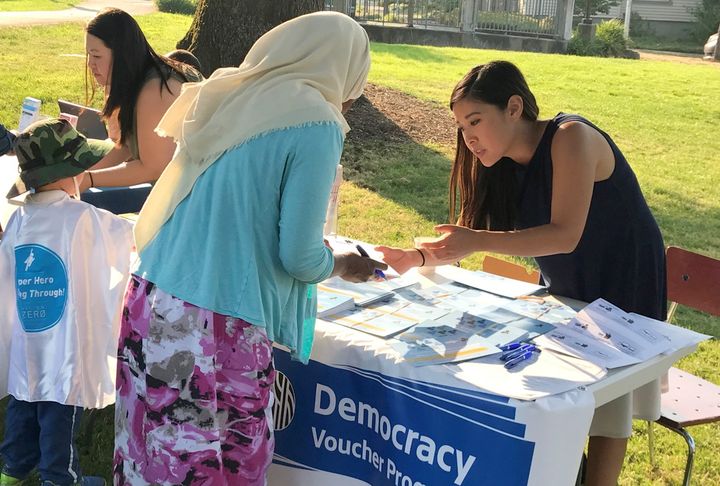With campaign spending on the rise in their city’s elections, voters in Portland, Maine will decide this November on a ballot question that aims to level the playing field for local office seekers.
The ballot question, called Clean Elections, would create a voluntary public campaign financing program for candidates running for municipal office in Portland—one similar to a well-established program offered to candidates for state office in Maine. If approved, the Clean Elections program would make Portland the first municipality in Maine to offer public funding for candidates. The measure would also ban all candidates from taking corporate contributions, prohibit entities under foreign influence from making expenditures related to ballot questions, and enhance transparency of campaign contribution information.
The Clean Elections initiative was approved to appear on the ballot on July 11 by the Portland Charter Commission, a body created in 2020 to review changes to the City Charter. The initiative then received the green light to appear on the ballot on Sept. 1 from the City Council.
The campaign backing the measure, Fair Elections Portland, says it “will put power back in the hands of the people” and empower elected officials to represent the people who elected them rather than special interests.
We already had strong experience with using a clean elections system at the state level, passed by referendum in 1996, a longstanding and popular program.
Anna Kellar, campaign manger, Yes on 3—Clean Elections
Though the U.S. Census estimated Portland’s population at a modest 67,000 as of 2020, city elections have become increasingly expensive. The most recent race for Portland mayor in 2019 saw record amounts of money, with candidates raising into the six figures and PACs jumping in to back their preferred candidates. Fair Elections Portland, which is leading the effort on the ballot question, compiled figures showing that overall spending in the 2019 race for mayor was more than double that of the city’s 2015 contest. Over the past decade, candidate fundraising totals have also grown sharply in elections for Portland at-large council seats, district council seats, and school board races, according to data from Fair Elections Portland.
“In 2017, a group of Portland activists started talking about the increasing problem of money in politics at the local level,” said Anna Kellar, campaign manager for the Yes on 3 campaign, the Clean Elections question. “What had always been low-key local elections were becoming much more hotly contested and high-spending, and with that all of the concerns that go along—could ordinary people afford to run, what kind of influence was it buying over local officials?

“With that problem, we were lucky to have a solution right in front of us: we already had strong experience with using a clean elections system at the state level, passed by referendum in 1996, a longstanding and popular program,” Kellar told Sludge. “Candidates for state legislature in the Portland area use it, and there’s a high degree of familiarity with it in the city. A decision was made to head to a charter amendment for a clean elections program.”
In Maine, a voluntary public funding system for participating candidates for all state offices was passed by voters in 1996 as the Maine Clean Elections Act, and strengthened by a referendum in 2015. The program requires candidates to gather a certain amount of $5 contributions from voters in their district in order to qualify, and then commit to only spending money they receive from the state while eschewing all private funding.
From the 2016 to 2020 election cycles, 55% of state candidates participated in the grants program, according to a March 2021 report from the group Democracy Maine. The report also shows that as of the 2020 election, public funding has grown to become the larger share of state campaign spending, after having been dominated by privately-raised funding as recently as 2016.
At its peak, up to 85% of the legislature used Clean Elections, according to Andrew Bossie, the former executive director of Maine Citizens for Clean Elections (MCCE), with seven out of 10 women in office saying that having a public financing option was very important in their decision to run.
In Portland, the Clean Elections program, proposed to start in the 2023-2024 elections, would—similar to the state system—issue funding to participating candidates who prove support from Portland residents, abide by limits on private contributions, and agree to take part in at least one public debate, among other things. As with other public campaign financing programs in states and cities, the city clerk’s office would create a searchable online database of all campaign finance information. Any unused funds in Portland’s system would be returned to the Clean Elections Fund.
A cost estimate prepared by the Charter Committee placed the per-cycle total of the program at about $290,000, an amount substantially less than candidates had been raising for mayor, even before including fundraising for city council and school board positions.
In addition, the Clean Elections question would require the city to adopt rules that ban corporate contributions to municipal candidates for office and prohibit foreign entities from spending on ballot questions, whether by contributing to campaigns or by making direct expenditures. In June of last year, the Maine legislature passed and the governor signed a bill prohibiting corporate contributions to candidates, joining 23 other states and the federal government in the prohibition. Companies may still establish separate segregated fund committees, or PACs, and allow PACs to use their telephones and computers.
Long Path to Ballot
The Clean Elections question will appear on the November ballot after a delay of several years spent navigating legal questions. In the summer of 2019, organizations including the League of Women Voters of Maine and Maine Citizens for Clean Elections gathered enough signatures to place a clean elections question on the ballot, with over 8,000 signatures from Portland residents. In September 2019, however, the City Council voted to prevent the citizen’s initiative from appearing on the ballot, mounting an argument that the initiative would instead require a lengthier charter revision process, a decision that triggered years of legal challenges from advocates.
Kellar says that in 2019 the coalition reached the formidable signature threshold with volunteer efforts across the city, “a combination of door-to-door, street corners and farmers markets, and community meetings.” One campaign volunteer led outreach in Portland’s South Sudanese community, and another brought clean elections petitions to Portland arts and music venues.

In the summer of 2020, the city put out a call for a Charter Commission, a process that Kellar said opened up another path for the Clean Elections initiative to be approved to reach the ballot. Kellar says that Fair Elections Portland groups worked closely with commissioners—three appointed by the city council, nine elected by voters—in reviewing the municipal proposal in light of the state’s public financing system.
The Maine Commission on Governmental Ethics submitted a memo in September 2021 to the city’s Charter Commission on best practices for administering a campaign finance program that included guidelines on auditing and bookkeeping.
Because it would approve an amendment to the City Charter, Kellar said, the initiative would provide dedicated funding for the program, insulating the clean elections program from the risk of funding being stripped by the city council from year to year.
“After being caught up in the process since 2019, this ballot question is a return to the core issue: the cost of running for office,” Kellar said. “Let’s talk about the problem of money in politics and how clean elections can fix that. People need to know they have the opportunity to turn out and vote for something really positive that they already support in the state.”
Also this year, voters in Oakland, California will decide on a ballot measure that would create a public campaign financing option called “democracy dollars” for city candidates—a program similarly designed to increase participation in local politics and enable candidates from a wider variety of backgrounds to mount competitive campaigns for office.



